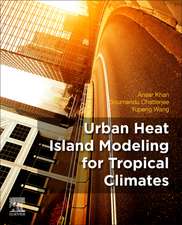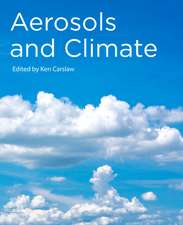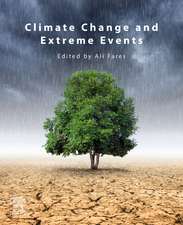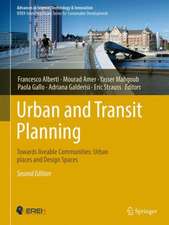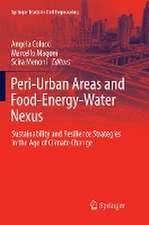Smart, Resilient and Transition Cities: Emerging Approaches and Tools for A Climate-Sensitive Urban Development
Autor Adriana Galderisi, Angela Coluccien Limba Engleză Paperback – 18 iul 2018
Smart, Resilient and Transition Cities: Emerging Approaches and Tools for Climate-Sensitive Urban Development merges a scientific approach with a pragmatic one. Through a case study approach, the Authors explore strengths and weaknesses of institutional and informal practices to foreshadow innovative paths for an adaptive process of urban governance in the face of climate change. The book guides the reader along new governance paths, characterized by continuous learning and close cooperation and communication among different actors and stakeholders and, in so doing, helps them to overcome current ‘siloed’ approaches to climate issues.
- Links resilience, smart growth, low-carbon urbanism, climate-friendly cities, sustainable development and transition cities, being all these concepts crucial to improve effective climate policies
- Includes a number of case studies showing how cities, different in size, geographical, cultural and economic contexts are currently dealing with climate issues, grasping synergies and commonalities arising from current institutional practices and transition initiatives
- Provides strategic and operative guidelines to overcome barriers and critical issues emerging from current practices, promoting cross-sectoral approaches to counterbalance climate change
Preț: 583.87 lei
Preț vechi: 641.62 lei
-9% Nou
Puncte Express: 876
Preț estimativ în valută:
111.74€ • 115.43$ • 92.99£
111.74€ • 115.43$ • 92.99£
Carte tipărită la comandă
Livrare economică 19 martie-02 aprilie
Preluare comenzi: 021 569.72.76
Specificații
ISBN-13: 9780128114773
ISBN-10: 0128114770
Pagini: 320
Dimensiuni: 216 x 276 mm
Greutate: 0.74 kg
Editura: ELSEVIER SCIENCE
ISBN-10: 0128114770
Pagini: 320
Dimensiuni: 216 x 276 mm
Greutate: 0.74 kg
Editura: ELSEVIER SCIENCE
Cuprins
1. The Smart City Metaphor to Foster Collaborative and Adaptive Decision-Making Processes in the Face of Climate Issues2. The Resilient City Metaphor to Enhance Cities’ Capabilities in the Face of Complexities and Uncertainties Arising from Current and Future Climate Scenarios3. The Transition Approach in Urban Innovations: Local Responses to Climate Change4. Smart, Resilient and Transition Cities: Commonalities, Peculiarities and Hints for Future Approaches5. European Strategies and Initiatives to Tackle Climate Change: Towards an Integrated Approach6. The American Approach to Climate Change: A General Overview and a Focus on Northern and Arctic Regions7. Climate Change Mitigation and Adaptation Initiatives in Africa: The Case of the CDKN ‘Working With Informality To Build Resilience In African Cities’ Project8. Addressing Climate Change in China: Policies and Governance9. Mitigation and Adaptation Strategies in the Face of Climate Change: the Australian Approach10. European Cities Addressing Climate Change11. Adaptation and Spatial Planning Responses to Climate Change Impacts in UK: the Case Study of Portsmouth12. Land-Use Planning and Climate Change Impacts on Coastal Urban Regions: The Cases of Rostock and Riga13. Importance of Multi-Sector Collaboration in Dealing with Climate Change: The Case of Belgrade14. Genoa and Climate Change: Policies and Adaptation15. The Evolution of Flooding Resilience: The Case of Barcelona16. Athens Facing Climate Change: How Low Perceptions and the Economic Crisis Cancel Institutional Efforts17. Sustainability of Climate Policy at Local Level: The Case of Gaziantep City18. Towards Integration: Managing the Divergence between National Climate Change Policies and Urban Planning in Ghana19. Spatial Planning for Climate Adaptation and Flood Risk: Interpretation of the Sponge City Program in Guangzhou, China20. Climate Change and Australian Local Governments: Adaptation between Strategic Planning and Challenges in Newcastle (NSW)21. Transition Initiatives: Three Exploration Paths22. Transition Towns Network in United Kingdom: The Case of Totnes23. Transition Towns Network in Italy: The Case of Monteveglio24. Model for Integrated Urban Disaster Risk Management at the Local Level: Bottom-Up Initiatives of Academics25. Enhancing Community Resilience in Barcelona: Addressing Climate Change and Social Justice Through Spaces of Co-Management26. Barriers to Societal Response and a Strategic Action Plan Towards Climate Change Adaptation and Urban Resilience in Turkey27. Victims or Survivors: Resilience from the Slum Dwellers Perspective in India28. Bottom-Up Initiatives for Climate Change Mitigation: Transition Cities in Newcastle 29. Integrated knowledge in climate change adaptation and risk mitigation to support planning for reconstruction30. Boundaries, Overlaps and Conflicts between DRR and Adaptation to CC: Are there Prospects of Integration? 31. The Contribution of Economic Thinking to Innovate Disaster Risk Reduction Policies and Action32. Flood Resilient Districts: Integrating Expert and Community Knowledge in Genoa33. Drawing Lessons from Experience34. Future Perspectives: Key Principles for a Climate Sensitive Urban Development
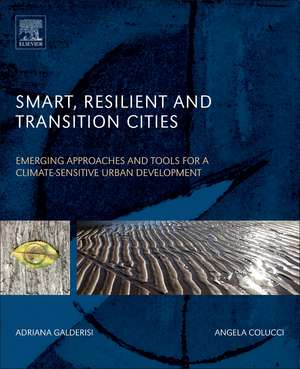


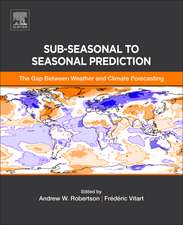
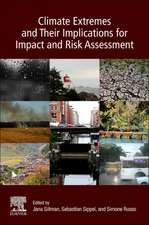
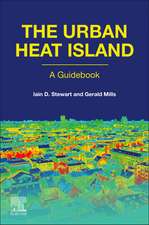
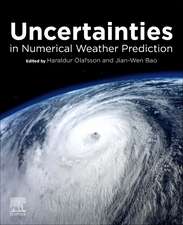
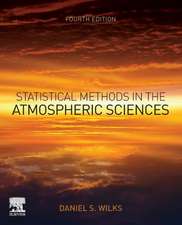
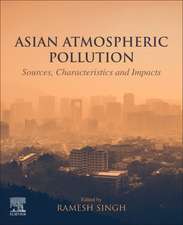
![[ECO]systems of Resilience Practices: Contributions for Sustainability and Climate Change Adaptation](https://i3.books-express.ro/bt/9780128191989/eco-systems-of-resilience-practices.jpg)
